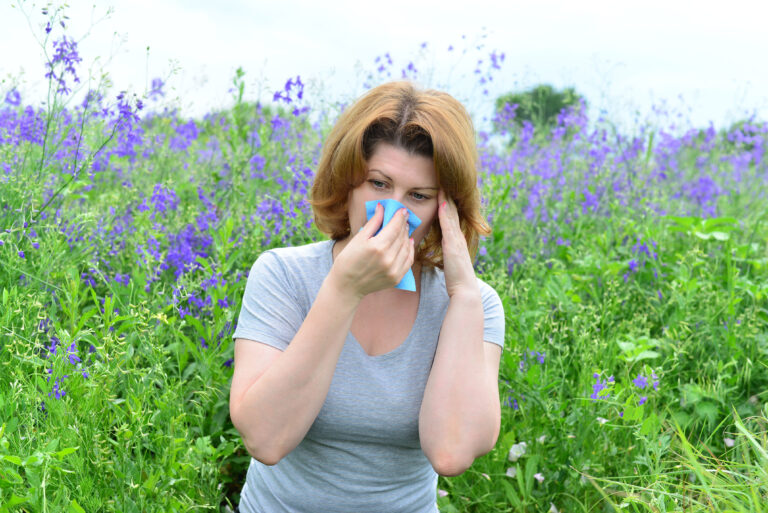This time of year, people are running to the pharmacies and acupuncturists looking for ways to offset the miserable effects of allergies. Right now, we are vacillating between wind-blown pollens that trigger allergies, and the persistent rains that create mold-related allergies. Either way, it is distressing. Before grabbing for a bottle of medications, you may want to consider the risks.
Certain allergy medications (as well as some antidepressants and bladder control drugs) block a brain chemical called acetylcholine. They are referred to as anticholinergic drugs. Acetylcholine is a neurotransmitter that is important for brain function. The worst appears to be diphenhydramine (Benedryl). Short term side effects can include sedation, increased fatigue, sleepiness, decreased motivation, low blood pressure, drowsiness, dizziness, blurred vision, difficulty urinating. Impaired cognitive functions such as alertness, confusion, attention deficits, decreased executive function, reduced reaction time and lack of vigilance are also problems. Long term detriments include up to 54% increased risk of dementia. Also observed in the studies was an increased risk for delirium, disorganized speech, altered consciousness, all of which has a greater risk if the person has liver or kidney impairment and the elderly.
Contrast that with acupuncture. According to the millions of patients having received acupuncture for their allergies, asthma and other respiratory disorders for literally thousands of years, and also according to research published in American Journal of Rhinology & Allergy found that acupuncture was not only safe, but extremely effective for the treatment of allergic rhinitis (allergy symptoms). The researchers then noted “Our meta-analysis showed that (the) acupuncture group has (a) superior effect in reduction of both rhinitis symptoms and the requirement for antiallergic medication compared with (the) control group.” According to HealthCMI, writing about the findings “The quality of life score significantly improved with acupuncture and was a measure of several components: sleep, non-nasal/eye symptoms, emotional function, practical problems, nasal symptoms, eye symptoms, activities. Serum IgE score improvements were found in the acupuncture group.” The researchers note that, “This result showed strong and consistent evidence that acupuncture treatment leads to favorable responses in immunologic outcomes, which have been shown to be helpful in trials of proven therapeutic modalities, such as allergen-specific immunotherapy.”
In a study published in the International Journal of Pediatric Otorhinolaryngology of 1,000,000 children under the age of 18 (of which 97,401 children had allergic rhinitis.) compared acupuncture with a medication for allergies, Loratadine. The short-term results showed a 96.7% effective rate with acupuncture short term, with an achieved 86.7% long term success rate, compared to loratadine 56.7%. They summarized “[The]Acupuncture group produced significantly greater diminution of nasal symptoms than did (the) control group.” And demonstrated that acupuncture “was superior to the control group in improving physical health.” And “The acupuncture therapy presents the obvious advantages on long-term efficacy.”
If drug therapy for allergies concerns you and you would like to try something safer, try acupuncture – it works!
©2020 Holly A. Carling, O.M.D., L.Ac., Ph.D.







